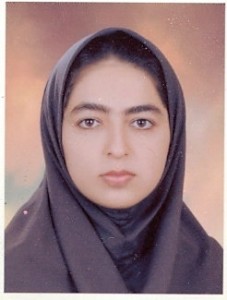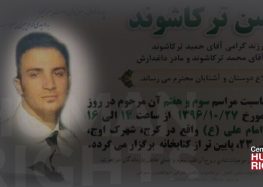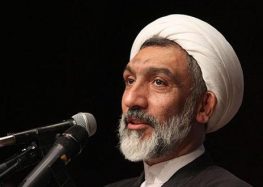Violations of Law and Due Process Standards in the Conviction of Atefeh Nabavi
Unfair trial of a woman from a politically active family
(30 November 2009) Judicial authorities should review the arrest, trial and conviction of Atefeh Nabavi, a 28-year-old woman sentenced to four years in prison for her participation in peaceful demonstrations following disputed presidential elections in June, appealed the International Campaign for Human Rights in Iran.
“The procedures leading to Atefeh Nabavi’s conviction and sentencing were so riddled with errors and human rights violations that the result is devoid of credibility and should be thrown out,” stated Hadi Ghaemi, a spokesperson for the Campaign.
“It is obvious that she was singled out because of her family’s history of political opposition,” Ghaemi continued.
Nabavi is the first woman to be sentenced for post-election protests. She was arrested on 15 June,and spent 95 days in ward 209 of Evin prison, which is controlled by the Intelligence Ministry, before being transferred to the prison’s public ward. She was tried in the Revolutionary Court, Branch 12, charged with “propaganda against the regime” and “acting against the regime” through her alleged relationship with the Mujahedin-e Khalq (MEK) organization, and with “disturbing the public order” and “conspiring against the regime” through participating in an illegal demonstration.
Nabavi was acquitted on the first two charges, but was sentenced to a 4-year prison term on the other two charges relating to her participation in the demonstration on 15 June.
According to Nasrin Sotoudeh, Nabavi’s lawyer, numerous errors were made by the authorities in the course of Nabavi’s case. Sotoudeh told the Campaign that when Nabavi was arrested along with seven of her friends in one of their houses, the handwritten summons from Judge Mortezavi mentioned ten other people and was of dubious authenticity and legality. Hundreds of the arrests after the June protests were undertaken with similar warrants.
According to Iranian law, temporary detention, if it is to be prolonged, should be renewed every month and the prisoner should be informed in advance and provided an opportunity to protest the legality of the detention order, but Nabavi was never provided with the detention order, and thus not given such an opportunity.
Article 77 of the Procedures for Public and Revolutionary Courts states that when a court is reviewing a case, any allegations and claims by the defendant should be addressed as well, but the judge refused to consider Nabavi’s claims that her arrest and detention had been illegal when they were raised by Mrs. Sotoudeh.
According to Mrs. Sotoudeh, most of Nabavi’s trial was devoted to discussions about the political background of her family, which had no bearing whatsoever on the actions for which she was charged, but suggested that she was being punished for these associations. The primary sentence has not been sent to Mrs. Sotoudeh as Nabavi’s lawyer. Nabavi was taken to the court and informed about the sentence and according to her, the sentence mentions the political record of her family.
Mrs. Sotoudeh said she informed the judge that over three million Iranians participated in demonstrations in the same way as Atefeh Nabavi, and could also be jailed for their peaceful demonstrations, which are protected by article 27 of the Iranian Constitution.





